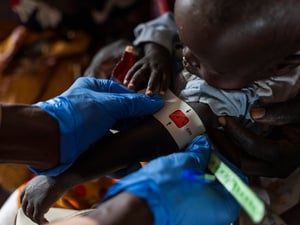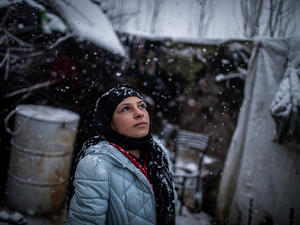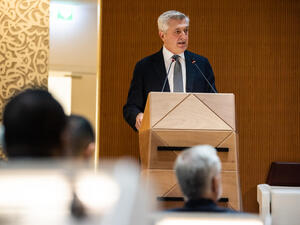120,000 refugees assisted to access Iran's health insurance scheme
120,000 refugees assisted to access Iran's health insurance scheme

Afghan refugee Abdulrahim Rostami, 66, holds his health insurance booklet in Tehran, Iran.
As the COVID-19 pandemic continues to affect refugees and host communities in the Islamic Republic of Iran, UNHCR, the UN Refugee Agency, is ensuring that another 20,000 refugees can access the country’s national health insurance scheme, taking the numbers assisted with health insurance to 120,000.
The health insurance aims to provide the most vulnerable among the nearly 800,000 Afghan refugees hosted in the country – as estimated by the Government of Iran - with desperately needed access to medical care.
UNHCR covered the costs of insurance premiums for some 100,000 vulnerable refugees enrolled in Iran’s Universal Public Health Insurance (UPHI) last year. However, with the COVID-19 pandemic and the prevailing economic downturn in Iran increasing vulnerabilities amongst refugees, UNHCR has agreed to temporarily increase the number of refugees covered by the scheme.
Despite the challenges, Iran has continued to generously give refugees access to education and health services. Iran is one of only a handful of countries in the world that offer refugees the option to enrol in national health insurance for essential secondary and tertiary public health services in the same way as Iranian nationals.
The national insurance scheme allows for free COVID-19 treatment and hospitalization. It also subsidizes the cost of surgeries, dialysis, radiology, laboratory tests, out-patient care and more.
However, many refugees are not able to afford the premium costs. The impact of the pandemic on livelihoods has been particularly severe for refugees, who usually rely on precarious and unstable jobs. Many can no longer cover their most basic needs, let alone the costs of health insurance, which is estimated to represent some 40 per cent of an average refugee family’s monthly expenditure.
UNHCR is concerned that fewer and fewer refugees will be able to afford the cost of health insurance in 2021 and beyond, increasing the likelihood that they will not seek treatment for their urgent health needs or that they will resort to borrowing money or sending their children to work, just to be able to afford health care. As a result, refugees will become even more vulnerable.
At the same time, against a backdrop of rising needs, UNHCR’s funding for its response in Iran is increasingly constrained, hindering our ability to adequately respond to rising needs. UNHCR’s 2021 funding appeal of US$97 million is only 7 per cent funded.
In December 2019, UNHCR, with partners, launched a support platform under the Solutions Strategy for Afghan Refugees to achieve more equitable burden-sharing and create real solutions for displaced Afghans. Health interventions for Afghan refugees in Iran are covered under this platform.
For more information on this topic, please contact:
- For Iran, Farha Bhoyroo, [email protected], +98 912 132 7183
- In Bangkok, Kasita Rochanakorn, [email protected], +66 64 932 0803
- In Bangkok, Catherine Stubberfield, [email protected], +66 665 929 8062
- In Geneva, Babar Baloch, [email protected], +41 79 513 9549
- In New York, Kathryn Mahoney, [email protected], +1 347 443 7646








